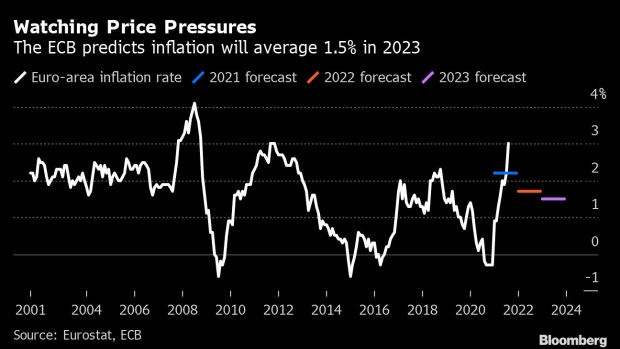Sep 17, 2021
ECB Officials See Faster Inflation Risk Days After New Forecast
, Bloomberg News

(Bloomberg) -- European Central Bank policy makers signaled they see euro-area inflation potentially exceeding forecasts as the economy recovers and supply bottlenecks drive up input prices.
The comments by three Governing Council members point to a more heated debate about the central bank’s current ultra-loose policy, with the pandemic-era bond-buying program set to expire by March next year.
Their remarks will also raise questions whether the staff projections that were only updated last week underestimated the potential of more persistent price pressures.
“If Covid does not surprise on the negative side, there is some upside for the inflation outlook over the medium term,” Governing Council member Martins Kazaks told Bloomberg in an interview on Thursday.
The region is now enduring the fastest price increases in a decade, with a rate of 3%. President Christine Lagarde has highlighted that this spike is largely transitory, and the forecasts show inflation will average 2.2% this year and slow to 1.5% by 2023. The ECB has an inflation target of 2%.
Gabriel Makhlouf, who heads the Irish central bank, said some policy makers already “believe that actually, the forecasts are too pessimistic.”
“Some of us do believe that at the moment, the forecast of reaching inflation of 1.5% in 2023 is too low,” he said during a webinar on Friday.
Vice President Luis de Guindos has adopted a similar stance, saying in a newspaper interview published on the same day that the fraying of global supply chains may push inflation higher than anticipated this year.
Wage Negotiations
He also said officials will pay a close attention to wage negotiations to see if price increases will spill into higher salaries, making inflation more entrenched than currently expected.
“So far we have seen few wage rises on the back of the higher prices,” he said. “That may change in the autumn.”
European government bonds remained under pressure on Friday, with the yield on 10-year Italian debt rising 3 basis points to 0.72%.
“Central banks are getting a bit nervous” though the situation differs a bit from country to country, said Anatoli Annenkov, an economist at Societe Generale in London. “It kind of fits with the general story, especially as we see the supply disruption staying with us a bit longer, there is this growing concern that you could see these second-round effects.”
The ECB, however, quashed a Financial Times report that said Chief Economist Philip Lane told analysts privately officials expect to reach the 2% inflation target by 2025.
Excessive Inflation
Kazaks and Makhlouf also warned against overestimating how long-lasting the impact of price pressures on the inflation outlook can be.
“At the moment, fears of excessive euro-area inflation are overstated and the current price pressures reflect transitory factors that will fade out over time,” Makhlouf said.
Kazaks, meanwhile, cautioned that “I am talking about decimals here” in regard to the ECB’s forecasts being adjusted upward, and said he’s yet to see inflation at or above the central bank’s 2% goal over the medium term.
“We hear some anecdotal evidence that there could be some wage pressures down the road, but we have not seen that yet in the data,” he said. “There is no reason to expect that inflation would be permanently very hot. If at some point inflation will be significantly higher than our strategy and monetary-policy mandate, then of course we will know how to react.”
©2021 Bloomberg L.P.